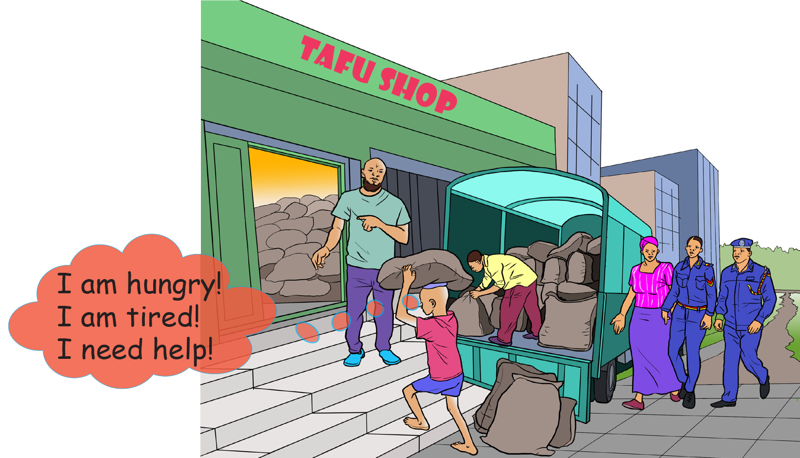Oral narrative
Activity 1. Look and tell
- Study the picture below. Tell your deskmate what you think is happening.

- Have you seen such a situation in your community? Talk about it.
Activity 2. Listen and discuss
Listen as your teacher reads the narrative: ‘Zakaria’s rescue’. In small groups, discuss the questions below.
- Retell the narrative you have listened to.
- What made Zakaria look for a job at his young age?
- Would you blame Zakaria for his suffering? Why?
- Do you think Zakaria achieved his dream of becoming an engineer? Explain.
- If you knew a person like Mr Tafu within your community, what would you do to rescue the children he or she is exploiting?
Tip
Listen attentively so that you may respond correctly to the questions given.
Zakaria’s rescue
In a faraway village, there lived a twelve-year-old boy named Zakaria. Zakaria’s parents loved him very much.They provided for all his needs and allowed him to play with his peers.They also taught him how to do some chores at home. They wanted Zakaria to be a responsible child as he grew up.
One day, by bad luck, Zakaria’s parents were involved in a road accident and passed away. Zakaria became very sad and was filled with fear. His tears were a river flowing down his cheeks. He knew that life would not be easy for him as an orphan.
After the burial, Zakaria went to live with one of his uncles. Zakaria’s uncle made him do all the domestic chores and other farm duties. He missed school quite often and had no time to play. Life was difficult.When he became a teenager, Zakaria made up his mind to run away from home. He went to the city and joined street children. Still, life became harder for him.
Zakaria decided to look for a job even though he was underage.That was how he started working at Mr Tafu’s shop. Every day, Zakaria would work for long hours with very little pay. He would carry heavy bags, sacks or boxes of goods in and out of the shop.
One day, officers from the children’s department visited the shop and arrested Mr Tafu.They said he would be charged with child labour and violation of children’s rights. Mr Tafu was exploiting Zakaria while paying him very low wages.
Zakaria was lucky to have been taken to an orphanage and enrolled back to school. He was grateful and as happy as a lark. He promised to work hard in school and become an engineer. Indeed, all is well that ends well.
Activity 3. Write or make an audio recording
- Retell the narrative, ‘Zakaria’s rescue’, as you record yourself on a digital device or rewrite the story in your books. (Do this with the help of your teacher, parent or guardian.)
- Share the written or recorded story with your class.
Vocabulary
Activity 4. Listen and find meanings
- The following words and phrases are used in the narrative, ‘Zakaria’s rescue’. Listen as your teacher plays an audio recording of them or reads them out aloud.
chores
orphan
orphanage
domestic
exploiting
street children
underage
teenager
wages
violating
- Say the words and phrases correctly.
- In small groups, discuss how the words and phrases have been used in the narrative.
- Choose the meaning of these words.
Word | Meaning |
a person aged between 13–19 years | |
too young to do something, for example drinking alcohol | |
a child whose parents are dead | |
homeless children who live on the streets | |
treating somebody unfairly by making them work | |
a task need to be done regularly | |
going against a law | |
a regular amount of money that is paid, usually every week or every month | |
relating to the running of a home or to family relations | |
a home for children whose parents are dead |
Activity 5. Find out
- The following expressions are used in the narrative, ‘Zakaria’s rescue’. Read them aloud.
passed away
all is well that ends well
made up his mind
tears were a river flowing down his cheeks
as happy as a lark - With your friends, find the meanings of the expressions above.
- Use the expressions to make sentences.
- Mention any other expressions you know.
- Share your work with the class.
Sound ia as in fear
Activity 6. Read and say
- Read these words aloud.
appear
gear
deer
cheer
clear
ear
hear
near
- Which sound is common in all the words above?
Tell the class.
Activity 7. Play a clapping game
- Listen as your teacher reads the narrative, ‘Zakaria’s rescue’.
- Clap every time you hear a word with sound ia.
- Play the same game in groups where one of you reads as others clap.
- As a class, practise saying the words with sound ia.
Further practice
- With your friends, search for ten more words with sound ia. You may use the internet (with the help of a teacher, parent or guardian), dictionary, newspapers or magazines.
- Practise saying aloud the words in number 1 above.
- Share the words with the class.
- As a class, practise saying the words with sound ia.
Project corner
- In small groups, create a poem that condemns child labour. (Use the vocabulary and expressions you have learnt on child labour so far.)
- Memorise the poem then recite it to your class.
- Recite the poem to your family or during a religious or political celebration in your community.
